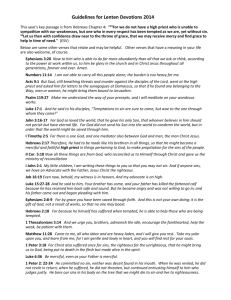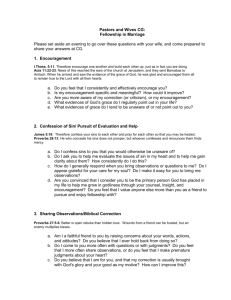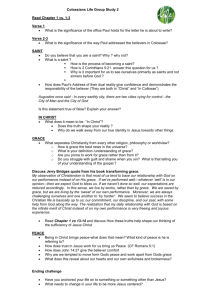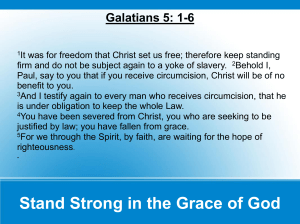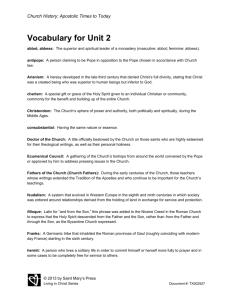Ephesians - 2:1-10 - Leader Notes
advertisement
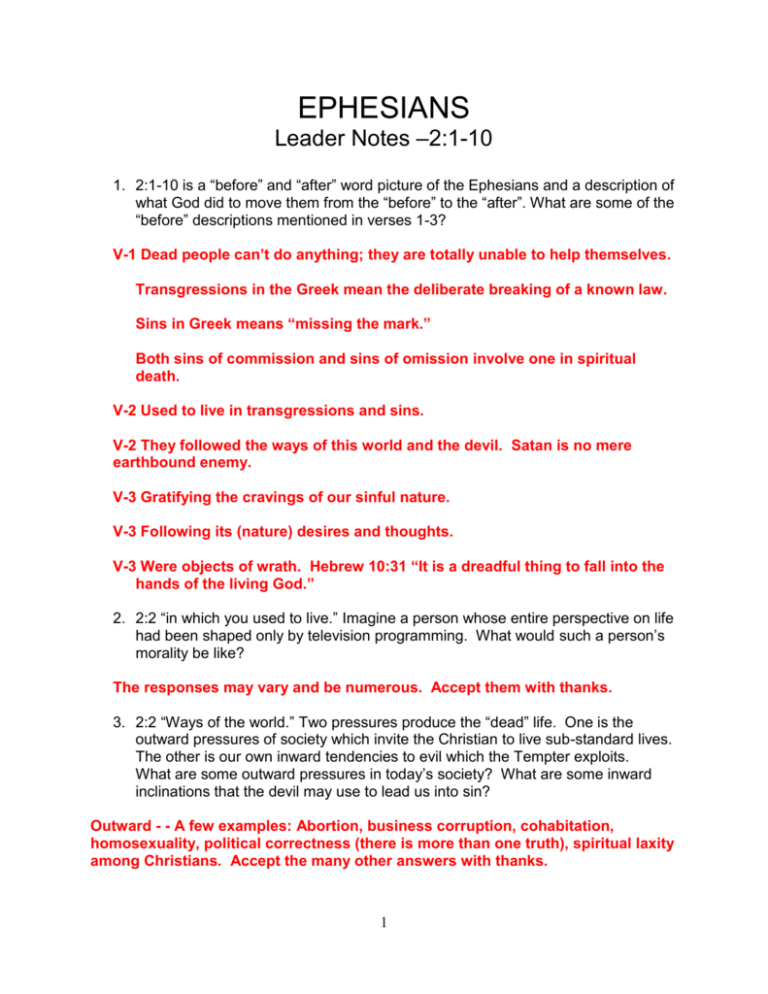
EPHESIANS Leader Notes –2:1-10 1. 2:1-10 is a “before” and “after” word picture of the Ephesians and a description of what God did to move them from the “before” to the “after”. What are some of the “before” descriptions mentioned in verses 1-3? V-1 Dead people can’t do anything; they are totally unable to help themselves. Transgressions in the Greek mean the deliberate breaking of a known law. Sins in Greek means “missing the mark.” Both sins of commission and sins of omission involve one in spiritual death. V-2 Used to live in transgressions and sins. V-2 They followed the ways of this world and the devil. Satan is no mere earthbound enemy. V-3 Gratifying the cravings of our sinful nature. V-3 Following its (nature) desires and thoughts. V-3 Were objects of wrath. Hebrew 10:31 “It is a dreadful thing to fall into the hands of the living God.” 2. 2:2 “in which you used to live.” Imagine a person whose entire perspective on life had been shaped only by television programming. What would such a person’s morality be like? The responses may vary and be numerous. Accept them with thanks. 3. 2:2 “Ways of the world.” Two pressures produce the “dead” life. One is the outward pressures of society which invite the Christian to live sub-standard lives. The other is our own inward tendencies to evil which the Tempter exploits. What are some outward pressures in today’s society? What are some inward inclinations that the devil may use to lead us into sin? Outward - - A few examples: Abortion, business corruption, cohabitation, homosexuality, political correctness (there is more than one truth), spiritual laxity among Christians. Accept the many other answers with thanks. 1 Inward - - These problems come from our pet sins for which we seem to have a weakness. 4. 2:3 What are some examples of “cravings”? The word Paul uses for cravings carries the idea of wanting that which is forbidden, seeking that which is clearly wrong. Before we have become Christians, our glands speak louder than our brains or our conscience. We follow our appetites. Like Big Bellied Ben in the old nursery rhyme, we eat the church, we eat the steeple, we eat the town, we eat the people. Our insatiable desires take us to extremes. In ancient Rome they built a vomitoria in homes so that the gorged could regurgitate and return and eat more. 5. 2:4 What motivates God? His great love for us (the whole world) – This is agape love. It speaks of a love and affection that is totally one-way. It all comes from God. Nothing in man the sinner, the God-hater, the spiritual corpse, drew God to him. Love resids only in the heart of God. God is rich in mercy. Mercy is the attitude in the mind and heart of God that moves Him to take pity on us when He sees our lost and wretched state. God’s mercy is his overflowing active compassion, freely exercised, excluding all idea of merit on the part of humans. 6. 2:5-10 What are the “after” results? V-5 We are made alive in Christ – This is done through baptism. V-5 We are saved by grace V-6 We are raised up with Christ – It means to revive spiritually. V-6 We are seated with Him in the heavenly realms – The Christian finds himself already an honored guest, and adopted member of the family of God in God’s presence. V-7 So He might show us the incomparable riches of His grace expressed to us in Christ Jesus. There is nothing in our present range of experience that can compare with heaven. His riches are a useful goodness and gentleness. They come to us as Jesus dealt with the woman that was caught in sin, with the thief on the cross, with Peter or with Saul. 2 V-8 Saved us by grace – It is utter generosity, unselfishness , spontaneous, recklessly prodigal generosity, which acts wholly out of loving concern for the other’s need. Man is completely unworthy of the love and help thus offered to him. V-8 Through faith – Grace is the “give” word; faith is the “receive” word. Faith itself is regarded by St Paul as a gift (Phil 1:20). The point of the verse is that the whole process is not something we do for ourselves; God does it all for us. V-8 Not from ourselves – No human effort can contribute to our salvation; it is the gift of God. The Greek literally says, “not from you.” – “You have not done this of your own strength.” V-8 It is a gift of God – Gifts are not earned. V-9 Not by works so that no one can boast – The only way good works could save us with a perfect and just God is if our whole life were perfect. God cannot accept a 99 percent morally perfect life. He requires 100 percent perfection. V-9 No one can boast – The idea behind the Greek word for boast is an attitude of self-congratulation and pride. V-10 God’s workmanship – The Greek for this word sometimes has the connotation of a “work of art.” Another way of expressing the idea of “workmanship” is to say that someone who has very lovingly crafted something. V-10 Created in Christ Jesus to do good works, which God prepared in advance for us to do. – God has much work for us to do. Good works are a crucial aspect of the Christian life. Our good works, however, become an expression of thankfulness for all Christ has done for us, not an attempt to win heaven. “Prepared” carries forward the theme of God’s purpose and planning, seen in chapter. 1. We need not puzzle about and search for what may please God. He has long ago mapped out the entire course. Our works all spring from faith. 7. 2:8-9 Paul again piles term upon term to make his point. What is the point that Paul is making? There is no other way to be saved than by God’s grace through the faith He works in our hearts. 3
